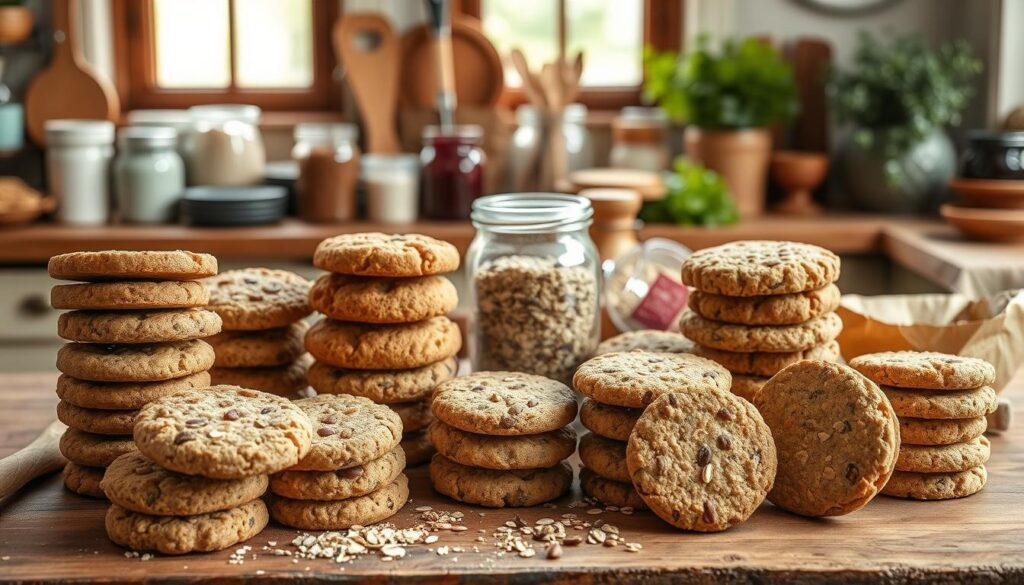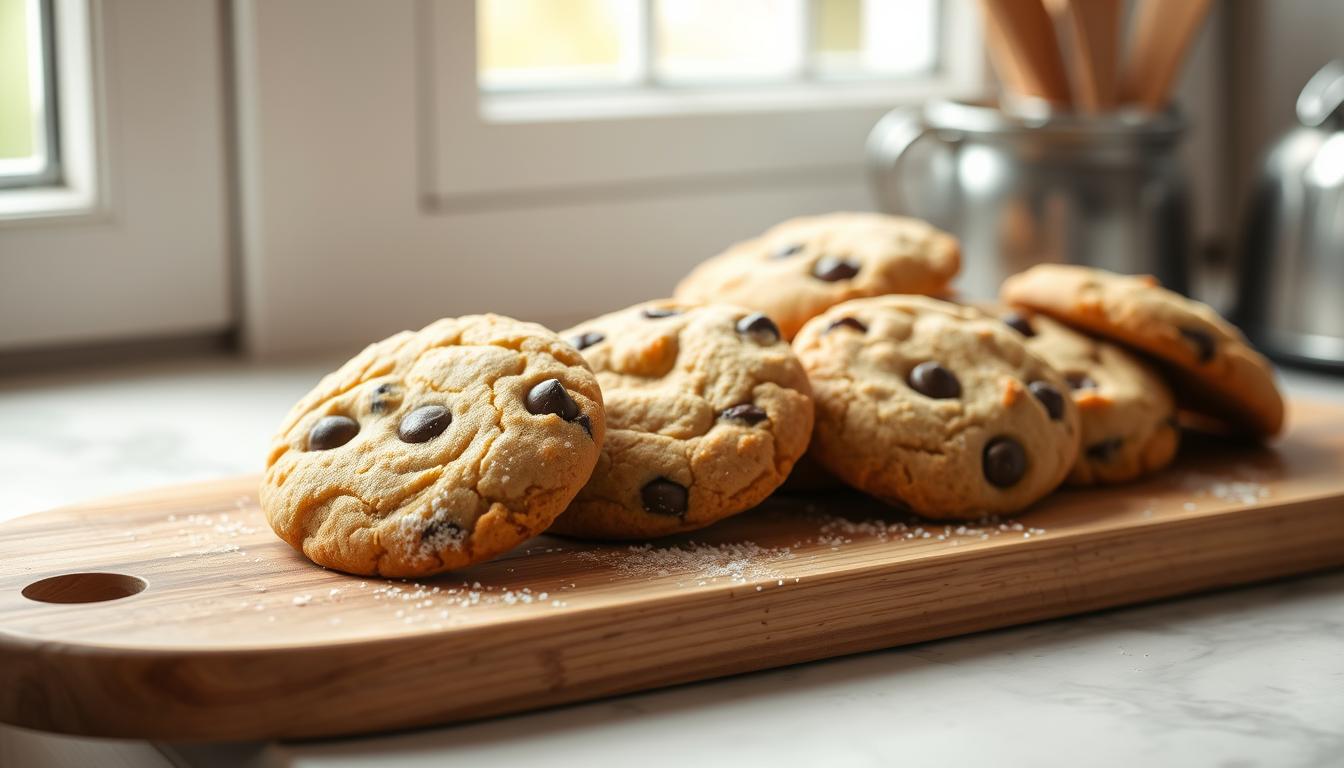In every British kitchen, there’s a special moment. The smell of fresh cookies wafts through the air. I remember my grandmother making golden, crisp treats that brought us all together.
Creating the perfect cookie recipe UK is more than baking. It’s about making memories. Whether you’re new to baking or have lots of experience, these easy recipes will make your kitchen warm and welcoming.
British baking is all about making delicious biscuits. They’re great for afternoon tea or a comforting treat after a long day. In this guide, we’ll share traditional and modern baking techniques.
You’ll learn how simple ingredients can make amazing treats. These will impress your family and friends. From classic chocolate chip to new flavour combinations, our recipes will inspire you to enjoy baking.
So, get ready to bake and make delicious memories in your kitchen. It’s time to roll up your sleeves and start baking!
Table of Contents
Essential Ingredients for Perfect British Cookies
Making delicious homemade biscuits in the UK is all about the right ingredients. Choosing wisely turns a simple recipe into a special treat. It brings the true taste of British baking to your table.
Creating amazing cookies begins with knowing your ingredients. Quality is key in British baking. Each ingredient adds to the flavour and texture of your cookies.
Quality British Baking Ingredients
The base of great British cookies includes a few essential ingredients:
- Unsalted British butter (preferably from local dairy farms)
- High-protein wheat flour
- Unrefined caster sugar
- Free-range eggs
- Golden syrup for traditional sweetness
Essential Baking Tools and Equipment
Using the right tools is vital for perfect homemade biscuits in the UK:
| Equipment | Purpose |
|---|---|
| Digital kitchen scale | Precise ingredient measurement |
| Non-stick baking trays | Even cookie distribution |
| Silicone baking mat | Prevent sticking and ensure uniform baking |
| Cooling rack | Prevent soggy bottoms |
Ingredient Substitutions
Being flexible is important in UK baking. Here are some alternatives for different diets:
- Gluten-free flour for wheat-sensitive bakers
- Plant-based butter for vegan recipes
- Coconut sugar as a low-glycemic sweetener
- Aquafaba as an egg replacement
Knowing these ingredients lets you make fantastic homemade biscuits in the UK. You’ll get delicious results every time.
Traditional British Cookie Techniques
Learning traditional cookie dough techniques is key to making delicious classic English cookies. Your baking adventure starts with mastering the basic methods that turn simple ingredients into amazing treats.
Creating traditional cookie dough involves several important techniques. British bakers have honed these methods over generations:
- Creaming butter and sugar until light and fluffy
- Carefully incorporating dry ingredients
- Achieving the perfect dough consistency
- Understanding texture variations
Chilling your traditional cookie dough is a step many home bakers miss. It lets ingredients settle and flavours mature. This results in richer, more complex cookies.
| Technique | Purpose | Impact on Cookies |
|---|---|---|
| Butter Creaming | Incorporate air into mixture | Lighter, softer texture |
| Dough Chilling | Solidify fat and relax gluten | Better shape and deeper flavour |
| Ingredient Mixing | Prevent overmixing | Prevents tough cookies |
Different textures need different approaches. Crisp cookies need less moisture, while chewy cookies get more moisture from eggs and cooler baking. Trying these techniques will help you make classic English cookies that stand out.
Classic Cookie Recipe UK: Step-by-Step Guide
Making homemade biscuits uk is all about precision and passion. Whether you’re new to baking or have lots of experience, this guide will help you make perfect cookies in your British kitchen.
Learning a classic cookie recipe uk starts with knowing the basic techniques. These steps will help you make delicious cookies.
Preparing Your Cookie Dough
Getting your dough right is key for the perfect texture and taste. Here’s what to do:
- Make sure all ingredients are at room temperature
- Measure everything accurately
- Cream butter and sugar until it’s light and fluffy
- Slowly add the dry ingredients
Baking Temperature and Timing
Getting the baking conditions right is important for homemade biscuits uk:
| Cookie Type | Temperature | Baking Time |
|---|---|---|
| Soft Chocolate Chip | 180°C | 10-12 minutes |
| Crisp Shortbread | 160°C | 15-18 minutes |
| Chewy Oatmeal | 170°C | 12-14 minutes |
Cooling and Storage Tips
After baking, cooling and storing your cookies right is key:
- Let cookies cool on the tray for 5 minutes
- Move them to a wire rack to cool fully
- Store in a sealed container
- Put a piece of bread in the container to keep it moist
Pro tip: Chill the dough for 30 minutes before baking. This stops it from spreading too much and keeps its shape.
Common Mistakes to Avoid When Baking Cookies
Mastering easy cookie recipes in UK baking means knowing common mistakes. These mistakes can ruin what could be a perfect treat. Even skilled bakers can fall into these traps.
When you start your UK baking journey, be careful of these big errors:
- Ingredient Temperature Mistakes: Cold butter or eggs can mess up your cookie’s texture. Make sure all ingredients are at room temperature before mixing.
- Inaccurate Measurements: Being precise is key in easy cookie recipes. Use the right measuring cups and level dry ingredients.
- Overmixing the Dough: Too much stirring can make your cookies tough. Aim for a tender texture instead.
Oven temperature is vital for great UK baking. Many bakers don’t realise this. A wrong oven setting can burn edges and leave centres raw. Think about getting an oven thermometer for accurate temperatures.
Cookie dough needs gentle care. Overworking it can make cookies dense and chewy. Remember, less is often more when mixing your dough.
- Chill your dough before baking for better shape and flavour
- Use parchment paper for even baking
- Rotate baking trays midway for consistent results
Avoiding these mistakes can take your easy cookie recipes to the next level. Remember, practice is key in UK baking!
Quick and Easy Chocolate Chip Cookie Recipe
Finding the perfect chocolate chip cookie recipe in the UK can make baking fun. These recipes are great for both new and seasoned bakers in the United Kingdom.
Making delicious chocolate chip cookies needs careful attention and top-notch ingredients. The right ingredients and method will make your homemade cookies irresistible.
Chocolate Selection Guide
Choosing the right chocolate is key for amazing cookies. Here are some tips:
- British chocolate brands like Cadbury work brilliantly
- Dark chocolate gives a deep, rich flavour
- Milk chocolate adds a classic sweetness
- Try premium chocolate chips for a gourmet taste
Texture Variations
Your baking technique greatly affects the cookie’s texture:
- Crispy cookies: Reduce moisture, bake longer
- Chewy cookies: Add extra brown sugar
- Soft cookies: Slightly underbake, use more flour
Decorating Ideas
Make your chocolate chip cookies stand out with these creative ideas:
- Sprinkle sea salt on top
- Drizzle melted chocolate
- Add chopped nuts for crunch
- Create sandwich cookies with buttercream
These easy cookie recipes are fun and versatile for all bakers. Have fun trying different things!
Healthier Cookie Alternatives and Dietary Options

Making tasty homemade biscuits uk doesn’t have to ignore health or dietary needs. Today’s british biscuit recipes meet many nutritional demands while keeping that beloved British taste.
Let’s look at some great alternatives for different diets:
- Gluten-Free Options: Try almond or coconut flour instead of wheat for tasty gluten-free treats
- Vegan Cookies: Swap plant-based butter and egg alternatives like mashed banana or chia seeds
- Low-Sugar Variations: Try natural sweeteners like stevia or cut sugar without losing flavour
“Healthy eating doesn’t mean sacrificing taste – it’s about smart ingredient choices!” – UK Baking Experts
For those cutting down on sugar, using wholegrain flour can boost your biscuits’ nutrition. Adding oats, nuts, and seeds gives them protein and fibre, making them both tasty and good for you.
By reducing butter and adding Greek yoghurt or applesauce, you can lower calories. These changes make your biscuits moist and full of flavour. They turn classic recipes into healthier options for all.
- Experiment with alternative flours
- Use natural sweeteners
- Incorporate nutrient-rich ingredients
Healthy baking is about finding the right balance and being creative. With these tips, you can make delicious cookies that are good for your body and soul!
British Tea Time Cookie Favourites
British tea time is a cherished tradition. It celebrates classic english cookies as essential companions to a warm cuppa. These delightful english teatime treats have been warming hearts and satisfying sweet cravings for generations.
Afternoon tea wouldn’t be complete without the perfect selection of biscuits. The UK boasts a rich culinary heritage of delectable cookies. These have become beloved staples in homes across the country.
Traditional Shortbread Recipe
Shortbread represents the pinnacle of classic english cookies, originating from Scotland. This buttery delight requires minimal ingredients but delivers maximum flavour. Here’s what makes shortbread special:
- Pure butter creates a rich, crumbly texture
- Simple ingredients: flour, butter, and sugar
- Traditionally triangular or round shaped
Classic Digestive Biscuits
Digestive biscuits are another iconic english teatime treat that has captured hearts worldwide. These wholesome biscuits offer a perfect balance of sweetness and substance.
Key characteristics of digestive biscuits include:
- Wholemeal flour base
- Subtle nutty flavour
- Excellent for dunking in tea
Whether you’re enjoying a quiet moment alone or hosting afternoon tea, these classic cookies will elevate your tea-drinking experience. They bring authentic British charm to your table.
Seasonal British Cookie Recipes
Explore the joy of seasonal British biscuit recipes all year round. From festive winter treats to summer garden party delights, these recipes will make your baking adventures unforgettable.
Christmas cookie ideas in the UK are truly special. They warm the heart and excite the taste buds. The UK’s rich culinary heritage offers more than just ordinary recipes.
- Winter Festive Cookies
- Gingerbread Men – A classic British Christmas favourite
- Mince Pie Inspired Cookies
- Spiced Fruit Biscuits
- Spring and Summer Treats
- Lavender Shortbread
- Lemon Zest Cookies
- Berry-infused Biscuits
Each season brings its own flavours and ingredients to British biscuit recipes. Autumn might inspire you with cinnamon and apple-studded cookies. Summer calls for light, zesty creations perfect for afternoon tea.
Make your Christmas cookies truly special by using local ingredients and traditional techniques. Think about using local butter, fresh eggs, and seasonal spices to enhance your baking.
Pro tip: Always use fresh, high-quality ingredients to ensure your seasonal cookies taste authentically British!
Whether it’s a cosy winter gathering or a summer garden party, these seasonal cookie recipes will wow your friends and family. They bring a delicious British charm to any occasion.
Tips for Baking Cookies with Children
Baking with kids in the UK is a great way to bond as a family. Easy cookie recipes make it fun to create memories and teach kids about the kitchen. It boosts their confidence, creativity, and practical skills in a fun setting.

To make your kitchen safe for kids, plan carefully and watch them closely. A safe and fun cooking space can spark a lifelong love for cooking.
Safety First in the Kitchen
- Always supervise children during baking activities
- Use child-friendly utensils with rounded edges
- Keep hot surfaces and sharp objects out of reach
- Wear protective aprons and oven mitts
- Wash hands thoroughly before starting
Age-Appropriate Baking Tasks
Children of different ages can help with baking in various ways:
- Toddlers (2-3 years): Mixing ingredients, pouring pre-measured items
- Preschoolers (4-5 years): Measuring dry ingredients, rolling dough
- School-age children (6-9 years): Cutting shapes, decorating cookies
- Teenagers (10+ years): Independent baking with minimal supervision
Baking with kids in the UK is a fun and educational activity. It creates lasting memories and teaches important life skills.
Cookie Storage and Preservation Methods
Keeping your homemade biscuits uk fresh is key. The right storage can make them stay tasty for days or weeks.
Start with the right containers. British biscuit tins are great for keeping cookies fresh. They keep moisture out and help cookies stay crisp.
- Use ceramic or metal containers with tight-fitting lids
- Separate different cookie types to prevent flavour mixing
- Keep cookies away from direct sunlight and heat sources
Freezing is a top choice for keeping cookies fresh for a long time. Wrap each cookie or layer well to avoid freezer burn and keep their taste.
| Storage Method | Expected Freshness Duration | Best For |
|---|---|---|
| Room Temperature (Airtight Container) | 5-7 days | Crisp, dry cookies |
| Refrigerator | 2 weeks | Soft, moisture-rich cookies |
| Freezer | 3 months | All cookie varieties |
For those who love baking in the UK, controlling moisture is important. Add a piece of bread to your container to keep the right humidity. Each cookie type needs its own storage to keep its unique taste and texture.
Pro tip: Always allow cookies to cool completely before storing to prevent condensation and prevent sogginess.
Remember, different cookies last for different times. Cookies with butter last longer than moist ones. By using these storage tips, your homemade biscuits uk will stay delicious, just like when they were fresh from the oven.
Troubleshooting Common Cookie Baking Issues
Baking cookies in the UK can sometimes present unexpected challenges. Even experienced bakers encounter texture and temperature problems. These issues can affect their cookie recipe UK results. Understanding these common issues will help you create perfect baked treats every time.
When practicing uk baking techniques, several texture problems might arise. Let’s explore some frequent issues and their solutions:
Tackling Texture Challenges
- Spreading Cookies: Refrigerate dough for 30 minutes before baking to prevent excessive spreading
- Hard Cookies: Reduce baking time and check oven temperature accuracy
- Uneven Browning: Rotate baking tray midway through cooking process
Managing Baking Temperatures
Different ovens can significantly impact your cookie recipe UK success. Professional bakers recommend these temperature adjustments:
| Cookie Type | Recommended Temperature | Baking Duration |
|---|---|---|
| Soft Chocolate Chip | 160°C | 10-12 minutes |
| Crisp Shortbread | 180°C | 15-18 minutes |
Remember to use an oven thermometer to ensure precise temperature control during your uk baking adventures. Small adjustments can transform your cookies from mediocre to magnificent!
Conclusion
Your journey through British biscuit recipes has been exciting. You’ve seen everything from traditional shortbread to modern chocolate chip biscuits. Homemade biscuits in the UK are more than treats; they connect us through generations.
Learning to make British biscuits takes time, effort, and love. Every recipe you try helps you understand the skills passed down in UK kitchens. Whether you’re new to baking or have experience, there’s something for everyone.
We encourage you to try out the techniques and recipes we’ve shared. Let your creativity run wild by making your own twists on traditional recipes. Share your baking stories with others in the UK, swap tips, and keep the tradition alive. Making delicious homemade biscuits brings happiness to those around you.
Your baking adventure is just starting. Enjoy the warmth of the kitchen, the smell of fresh biscuits, and the joy of making something special with your own hands.

